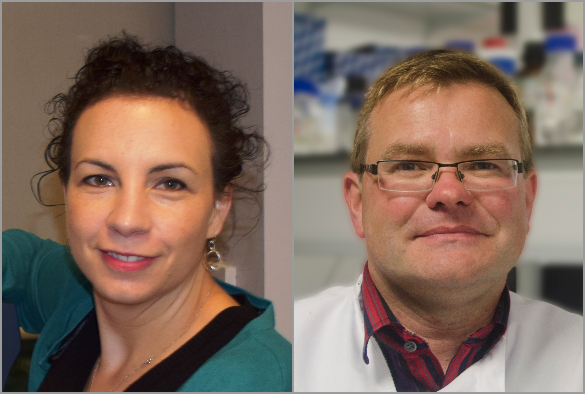
University of Liverpool scientists have been awarded Royal Society of Chemistry (RSC) Prizes for their outstanding research efforts.
Research and Innovation Prize
Professor Claire Eyers has been named winner of the RSC’s Jeremy Knowles Award in recognition of brilliance in research and innovation.
Professor Eyers won the prize for the development and application of novel mass spectrometry-based analytical strategies to discover, identify and quantify dynamic biomolecular post-translational modifications. Professor Eyers’ team use analytical chemistry strategies, specifically based around a technique called mass spectrometry, to explore the protein components of cells and tissues.
Professor Eyers said: “I’m incredibly honoured and excited that the science my team has been working on for so many years has been recognised by this prestigious award.”
Dr Helen Pain, Chief Executive of the Royal Society of Chemistry, said: “Great science changes the way we think about things – either through the techniques used, the findings themselves, the products that emerge or even in how we interact with the world and those around us. Importantly, it also allows us to reflect on the incredible people involved in this work and how they have achieved their results.
“The work of Professor Eyers is a fantastic example of why we celebrate great science, and we’re very proud to recognise their contribution today.”
Horizon Prize
A team of University of Liverpool researchers and their collaborators have been named as the winners of the RSC’s Chemistry Biology Interface Division Horizon Prize.
The Horizon Prizes celebrate the most exciting, contemporary chemical science at the cutting edge of research and innovation. These prizes are for teams or collaborations who are opening up new directions and possibilities in their field, through ground-breaking scientific developments.
Based at The Rosalind Franklin Institute, the University of Oxford, Diamond Light Source, Public Health England, and the University of Liverpool, ‘Team Nanobodies’ won the prize for the development of tools for the fight against Covid-19.
Team Nanobodies’ research has shown that nanobodies – a smaller, simple form of antibody generated by llamas and camels – can effectively target the SARS-CoV-2 virus that causes Covid-19. They found that short chains of the molecules, which can be produced in large quantities in the laboratory, significantly reduced signs of the Covid-19 disease when administered to infected animal models.
The Liverpool team included Professor James Stewart, Professor Anja Kipar, Professor Andrew Owen, Dr Jordan Clark and Dr Parul Sharma.
Dr Helen Pain added: “Some of the most incredible work in chemical science is carried out by teams and collaborations who use their diversity of thought, experience and skills to deliver astonishing results. These synergies are often at the very forefront of expanding our understanding of the world around us, and why our judges have such a difficult job selecting winners for our Horizon Prizes.”
The winners join a prestigious list of past-winners in the RSC’s prize portfolio, of which 50 individuals have gone on to win Nobel Prizes for their work, including 2016 Nobel laureates Jean-Pierre Sauvage, Fraser Stoddart and Ben Feringa.
The Royal Society of Chemistry’s prizes have recognised excellence in the chemical sciences for more than 150 years. For more information about the prizes please visit the RSC website.